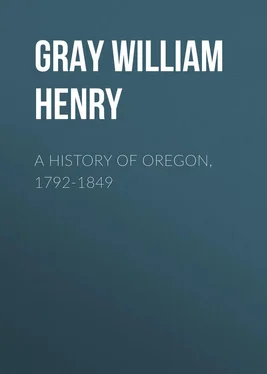William Gray - A History of Oregon, 1792-1849
Здесь есть возможность читать онлайн «William Gray - A History of Oregon, 1792-1849» — ознакомительный отрывок электронной книги совершенно бесплатно, а после прочтения отрывка купить полную версию. В некоторых случаях можно слушать аудио, скачать через торрент в формате fb2 и присутствует краткое содержание. Жанр: literature_19, foreign_antique, foreign_prose, Историческая проза, на английском языке. Описание произведения, (предисловие) а так же отзывы посетителей доступны на портале библиотеки ЛибКат.
- Название:A History of Oregon, 1792-1849
- Автор:
- Жанр:
- Год:неизвестен
- ISBN:нет данных
- Рейтинг книги:5 / 5. Голосов: 1
-
Избранное:Добавить в избранное
- Отзывы:
-
Ваша оценка:
- 100
- 1
- 2
- 3
- 4
- 5
A History of Oregon, 1792-1849: краткое содержание, описание и аннотация
Предлагаем к чтению аннотацию, описание, краткое содержание или предисловие (зависит от того, что написал сам автор книги «A History of Oregon, 1792-1849»). Если вы не нашли необходимую информацию о книге — напишите в комментариях, мы постараемся отыскать её.
A History of Oregon, 1792-1849 — читать онлайн ознакомительный отрывок
Ниже представлен текст книги, разбитый по страницам. Система сохранения места последней прочитанной страницы, позволяет с удобством читать онлайн бесплатно книгу «A History of Oregon, 1792-1849», без необходимости каждый раз заново искать на чём Вы остановились. Поставьте закладку, и сможете в любой момент перейти на страницу, на которой закончили чтение.
Интервал:
Закладка:
Do you ask me how I know these things? Simply by being at Vancouver the day the brig dropped down the Columbia River, and listening to the discussion excited on the subject, and to the proposition and plan of the Puget Sound Company among the gentlemen concerned in getting it up.
The mission of the American Board had no stock in the cattle company of the Wallamet, not venturing to incur the displeasure of the Hudson’s Bay Company by expressing an opinion any way upon it. The writer was picking up items and preparing for a trip to New York overland, with one of the Hudson’s Bay Company’s traders, Mr. Francis (or Frank) Ermatinger. While in New York, Cincinnati, and other places, he stated the fact that the Methodist missionaries had fallen under the displeasure of the Hudson’s Bay Company in entering too freely into trade and speculation in cattle in the country. Truth and justice to them require that I enter fully into their transactions as men and missionaries.
Rev. J. Lee, it will be remembered, was the first man to answer the call of the Indian to come to his country. The Methodist Board had been formed, and J. Lee accepted their invitation and patronage. In this expedition he gathered his associates, and at the same time made arrangements for future supplies to arrive by sea, coming around Cape Horn. Captain Wyeth was in Boston, getting up a trading expedition, and chartering a vessel for the mouth of the Columbia River, the May Dacre . On board Captain Lambert’s brig Captain Wyeth and the Methodist Board shipped their goods for the two expeditions. The goods on the way, it became necessary for the future objects of the mission to have a few horses to carry on the improvements necessary to a civilized life. Lee and associates start across the continent. Missouri is the most western limit of civilization. They reach it, purchase their outfit, and, in company with Captain Wyeth, reach Fort Hall; here they fall in with Thomas McKay and our English nobleman, Captain Stewart. Captain Wyeth stopped to build his fort, while McKay, Stewart, Lee, Dr. Nutall, Townsend, and parties all made their way to Wallawalla, on the Columbia River. The supreme selfishness of the Hudson’s Bay Company seems here to begin to develop itself. Lee and party were made to believe that the Flathead tribe, who had sent their messengers for teachers, were not only a small, but a very distant tribe, and very disadvantageously situated for the establishment and support of a missionary among them. These statements determined them to proceed to the lower Columbia, to find a better location to commence operations. Leaving their horses at Wallawalla, in charge of one of their party, they proceeded down the Columbia in one of the Hudson’s Bay Company’s boats, being eleven days in reaching the fort, and one hundred and fifty-two days on the way from Missouri. They were kindly received by the gentlemen of the fort, and in two days were on the hunt for a location.
The party that arrived just two years later, with two ladies, were not allowed to leave the fort to look for locations till they had remained twelve days, and been invited to ride all over the farm, and visit the ships, and eat melons and apples (being always cautioned to save all the seeds for planting).
Lee and party were frank to make known to the company their object, and plans of future operations. Questions of trade and morality were comparatively new with the company. As religious teachers and Christian men they had no suspicions of any interference in trade. Mr. Lee hailed from Canada, and so did Dr. McLaughlin and a large number of the servants of the company.
“Mr. Lee is the man we want to instruct our retired servants in religious matters. Mr. Shepard will be an excellent man to take charge of our little private school; we have commenced with a Mr. S. H. Smith, who has found his way into this country, in company with Captain Wyeth, an opposition fur trader and salmon catcher. We do not know much about him, but if you will allow Mr. Shepard to take charge of our school till you can make other arrangements, and you require his services, we will make it all right.”
This arrangement placed the labor of selecting locations and the necessary explorations upon our friend Jason Lee. All being smooth and cordial with the company, Lee proceeds to French Prairie and up the river till he reaches a point ten miles below Salem, about two miles above Jarvie’s old place, and makes his first location. From all the information he could gather, this was the most central point to reach the greatest number of Indians and allow the largest number of French and half-native population to collect around the station. In this expedition he occupied about ten days. The whole country was before them – a wilderness two thousand six hundred miles broad, extending from the gulf of California on the south, to the Russian settlements on the north, with a few scattering stations among the border Indians along the western territories of Missouri, and the great unknown, unexplored west, which the American Board, in a book published in 1862, page 380, says, “brought to light no field for a great and successful mission,” showing that, for twenty-five years, they have neglected to give this country the attention its present position and importance demanded, and also a total neglect on their part to select and sustain proper men in this vast missionary field. They are willing now to plead ignorance, by saying, “Rev. Samuel Parker’s exploring tour beyond the Rocky Mountains in 1836 and 1837 (but two years after the Rev. J. Lee came to it) brought to light no field for a great and successful mission
Конец ознакомительного фрагмента.
Текст предоставлен ООО «ЛитРес».
Прочитайте эту книгу целиком, купив полную легальную версию на ЛитРес.
Безопасно оплатить книгу можно банковской картой Visa, MasterCard, Maestro, со счета мобильного телефона, с платежного терминала, в салоне МТС или Связной, через PayPal, WebMoney, Яндекс.Деньги, QIWI Кошелек, бонусными картами или другим удобным Вам способом.
Интервал:
Закладка:
Похожие книги на «A History of Oregon, 1792-1849»
Представляем Вашему вниманию похожие книги на «A History of Oregon, 1792-1849» списком для выбора. Мы отобрали схожую по названию и смыслу литературу в надежде предоставить читателям больше вариантов отыскать новые, интересные, ещё непрочитанные произведения.
Обсуждение, отзывы о книге «A History of Oregon, 1792-1849» и просто собственные мнения читателей. Оставьте ваши комментарии, напишите, что Вы думаете о произведении, его смысле или главных героях. Укажите что конкретно понравилось, а что нет, и почему Вы так считаете.












